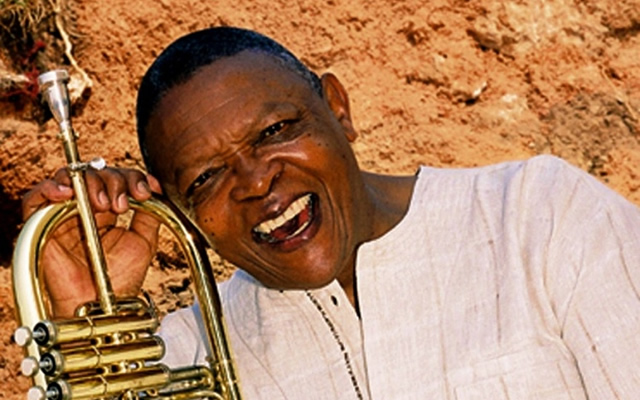Hugh reveals Zim roots

Jonathan Mbiriyamveka Entertainment Reporter
South Africa’s music legend Hugh Masekela has revealed his Zimbabwean origins indicating that his grandfather travelled to South Africa a long time ago.Speaking on Star FM’s popular Breakfast Show hosted by Comfort Mbofana yesterday Masekela said he is originally from Zimbabwe and a Karanga.
“I was born in Witbank but my great grandfather came from Great Zimbabwe. Our real surname is Munyepawu we are Karangas. We were adopted by the Batogwas (numeric people in the Limpopo Province) in the mid 19th century.
“My great grandfather was a Lutheran evangelist so he came with some German missionaries to convert the Tsongas, Ndebeles and Vendas.
“The Munyepawu were chief agriculturists at the time and (we had) to look for fertile land (which) is “masikela” and that is how we became Masekela. So coming to Zimbabwe is like (coming to my) spiritual home. That is why I’m always here,” Masekela explained.
Asked what he learnt in his music career spanning over 50 albums, Masekela or Bra Hugh to his fans, said Africans should be proud of their heritage.
“I think that the thing that has made me to get recognition internationally is I’m a child of heritage. I dip from the heritage pond and if you look at any African artiste who is known internationally . . . whether its Salif Keita, Angelique Kidjo, Miriam Makeba, Oliver Mtukudzi, Lady Smith Black Mambazo, or Mori Kante . . . they are all known because they come from a traditional background because they are themselves.
“And I think what I have learnt is that the more closer I am to people the more recognition I get. I didn’t go far but those who go far if you sing R&B and you are a man who are you competing with? You are competing with Marvin Gaye, James Brown, Lionel Richie and you are far even from the halfway line.
“If you’re a woman your competing with Aretha Franklin, Gladys Knight, Dione Warwick, it’s a long list you can’t even get into the kitchen but if you sing about your own people’s thing you’re in the frontline and that’s what people all over the world want to hear. That’s why those people who come from a heritage background are well known all over the world because the world is looking for the real Africa. They can’t find it because Africans don’t want to show the real Africa, they want to hide it,” he said.
He, however emphasised the need to preserve the African heritage so that other cultures can learn from it.
“So we are not promoting the same things that other nations are known by. Most nations are known by their cultures. When the British get royal marriage they bring out their thousands of years old pageantry. They go thousands of years back. When they have Olympic games they show us the industrial revolution just as it was.
“We only see the visibility of our heritage when there are visiting dignitaries or when there are political ceremonies but there is no home for our heritage and yet 80 to 90 percent of our people even the one in the city are really ethnic rural people.
“It’s like we don’t have ancient people because when we grow up all the wisdom and knowledge of our past is gone and we are people with an invisible heritage. The people who are the President’s (Mugabe) age are the last people with oral information about our praise poetry and who we are but we seem like very ashamed to hangout with them, we keep them in the backyard .
“So we are losing all of these values and valuable heritage that if we don’t preserve it now we are going to be a nation like the Mayans but those even still have some kind of monuments, you know, we just don’t want to be involved in our heritage and its a very sad thing and probably why we are not progressing economically and otherwise,” he lamented.
He said he feared the African heritage will be long forgotten by future generations such that Africans would lose identity.
“I fear for my grand children that when they ask them a few decades from now who they are they are probably going to say we used to be Africans long ago and it sounds like a joke.
“It’s a reality and there is no society that has more amazing content and diverse content than the African society internationally but we shun it.
“On a long term basis, we working on a format that will be an academy with amphitheatres where we can present integrated ethnic productions that are also exportable that would lure people to come back. You know when tourists come to Africa they come to see the Victoria Falls and geographical sites and the animals, they don’t come to see us because they can’t find us,” he said.
Bra Hugh has been in Harare for the past week where he among other things recorded with a new female mbira group yet to be named, as well as visiting the burial sites of one of his old friends Dumisani Maraire.
Brah Hugh first met Dumisani Mararire in the 1970s in the United States where the late mbira guru performed and taught music at Washington State University and Olympia, close to Los Angeles where Bra Hugh lived.
The two became bosom buddies such that Dumi would slaughter a goat for Bra Hugh whenever he visited before they play mbira music.
Bra Hugh also said that he was working towards establishing an international trust that would be open to all those who want to preserve the African heritage.
He, however, vowed not to collaborate with hip-hop artistes saying he wanted to preserve his own identity.








Comments